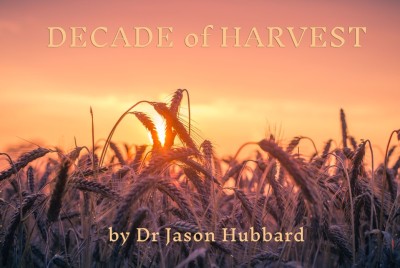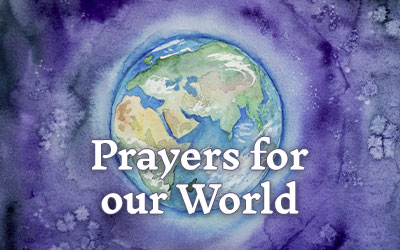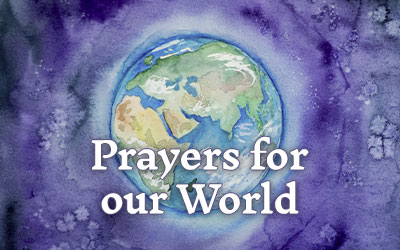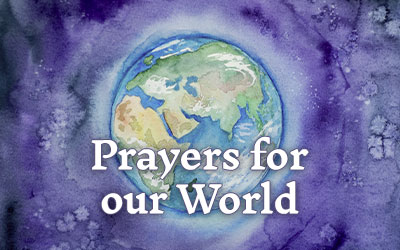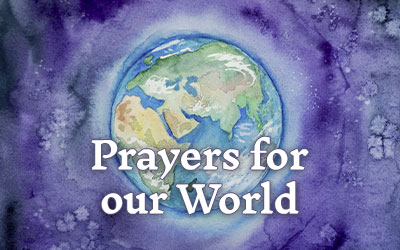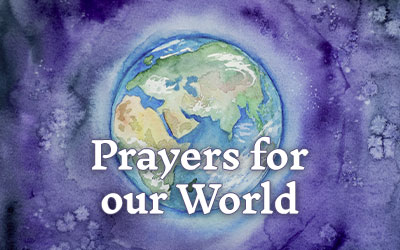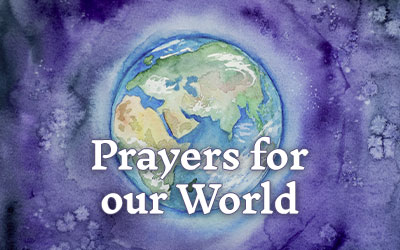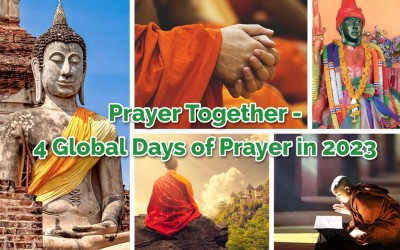Decade of Harvest – the Convergence of Gospel and Prayer Movements.
This year marks 300 years since the founding of the Moravian community in Herrnhut, Germany. Back in 1722, a group of 300 Bohemian Moravians fleeing persecution, arrived in north-eastern Germany. A wealthy aristocrat, named Count Zinzendorf, offered them refuge on his estate to build a small community named Herrnhut, which means "the watch of the Lord."
On August 13, 1727, during a communion service, they experienced a powerful move of God – an intense sense of God’s love for one another and for lost people beyond their community. What followed was focused, united, and strategic prayer that continued day and night for one hundred years. As men, women, and children prayed around the clock, God called missionaries amongst them. More than 300 people responded, and they helped establish over 5 thousand missionary settlements around the world.
Their love for Jesus compelled them to pray night and day and bring his love to the nations. Their purpose and mandate was to “Win for the Lamb who was slain, the due reward for his suffering,” and their motto was, “Our Lamb has conquered, let us follow Him.”
Today, I believe, we are seeing their vision for prayer being reborn. 2033 marks 2000 years of the Great Commission and the birthday of the Church. As we draw closer to this significant milestone, God is inviting us to a decade of harvest, where the human cooperation in prayer and the empowered proclamation of the gospel has begun to intersect with the divine sovereignty of God.
COVID-19 Draws Together Prayer and Gospel Movements
As COVID-19 spread globally, millions of believers joined together in prayer – from Indonesia to South Africa, India to Brazil, North Africa to the Middle East. They asked God the Father to give his Son, the Lord Jesus, the nations as his inheritance. While they prayed, the Church grew. One of the largest house church networks reported that during this period they grew from 2 million house churches to close to 3 million. This added 20 million new Jesus followers in just a few years! This is just one example of how prayer and gospel movements are converging.
 However, a massive amount of the Great Commission work remains. Even after 2000 years of Church history these spiritual realities continue:
However, a massive amount of the Great Commission work remains. Even after 2000 years of Church history these spiritual realities continue:
- 80 percent of the world’s Muslims still do not know a single Christian.
- 1,708 people groups do not have a Bible in their own language.
- 1.8 million people in the 100 largest remaining unreached people groups, mostly in South Asia, remain only one percent Christian.
And if we continue to do what we have been doing, 500 million Chinese will never hear the good news of Jesus.
Jesus shared this tension with his disciples in Matthew 9:35–38 (ESV), “When he saw the crowds, he had compassion for them, because they were harassed and helpless, like sheep without a shepherd. Then he said to his disciples, “The harvest is plentiful, but the laborers are few; therefore pray earnestly to the Lord of the harvest to send out laborers into his harvest.”
Jesus gives us the solution to the problem of an abundant harvest without adequate workers – pray earnestly! In fact, 19 chapters before Jesus says, “Go Therefore and make disciples of all nations…” he says, “Pray Therefore!” As Dick Eastman, the president of Every Home For Christ, and one of the most respected prayer mobilizers in the world says, “the degree to which prayer is mobilized is the degree to which the world will be evangelized”
In this command, Jesus doesn’t use the common Greek word for prayer. He uses the word deomai, which means to ‘plead desperately.’ And he doesn’t simply tell the disciples to pray for laborers to be sent out to the harvest fields. He uses the word ekballo, which means to ‘drive out, or hurl forth.’ This is the same word he uses when he casts out demons in both Matthew 9:38 and Luke 10:2. So if we review Matthew 9:35-38 once more, we see Jesus commanding us to plead desperately to the Lord of the harvest to forcefully thrust out laborers into his harvest!
Desperate Prayer Moves Nations
Indonesia
Followers of Jesus in Indonesia experienced great persecution in the 1990’s. Then the 2004 tsunami unleased tragic devastation – more than 225,000 people died in Indonesia, Thailand, India, Sri Lanka, and Maldives. In response, the Indonesian Church came together in unifed desperate prayer.
 On May 17, 2012, 120,000 people – including 9500 prayer and mission’s leaders from 86 nations, 20,000 children ages 4-14, and 20,000 young adults ages 18-30 – gathered in Indonesia’s capital city, Jakarta, for the World Prayer Assembly (www.worldprayerassembly.org). The crowd filled the city’s soccer stadium. An additional 385 other stadiums filled with even more Indonesian Christians who joined in praying. They urgently asked God to send a fresh wave of the knowledge of the glory of the Lord to cover the earth as the waters cover the seas (Hab. 2:14).
On May 17, 2012, 120,000 people – including 9500 prayer and mission’s leaders from 86 nations, 20,000 children ages 4-14, and 20,000 young adults ages 18-30 – gathered in Indonesia’s capital city, Jakarta, for the World Prayer Assembly (www.worldprayerassembly.org). The crowd filled the city’s soccer stadium. An additional 385 other stadiums filled with even more Indonesian Christians who joined in praying. They urgently asked God to send a fresh wave of the knowledge of the glory of the Lord to cover the earth as the waters cover the seas (Hab. 2:14).
By 2022, Indonesia had nearly 600 city-wide prayer networks united across denominations and generations. In the first quarter of 2022, they celebrated 10 years since the first World Day of Prayer by coming together in a virtual assembly. Thousands gathered at watch parties across Indonesia, and they were joined by participants from 101 other nations. Under this canopy of connected, strategic, and sustainable prayer, the Church in the world’s largest Muslim nation has grown extraordinarily fast.
 West Africa
West Africa
Since 2019 Last Quarter Evangelism (LQE) has mobilized millions of children and youth in West Africa between four and 14 years old to pray and share their faith. The student-designed, student-led outreach program runs from Oct. 1 – Dec 31 each year. It is done in partnership with All Africa Baptist Fellowship (AABF), All Africa Baptist Youth Fellowship (AABYF) and The Prayer Covenant. During the first two years of this large initiative, more than one million people across more than 30 nations came to Jesus as a result of the witness and testimony of these young people.
Middle East
During Ramadan in 2022, we saw more than 10 thousand people commit to pray 15 minutes each day for 24 unreached Muslims cities throughout the Middle East. Their combined commitment totaled more than 43,000 hours of prayer using specific Bible-based prayer points. We culminated our prayers on the last day of Ramadan. Muslims call this the Night of Power – a night which commemorates when they believe God revealed the Quran to Mohammed through the angel Gabriel.
We called our night of prayer, One Miracle Night. During that night Reaching Unreached Nations Ministries (www.runministries.org), the Jesus Film global leadership team and partners, International Prayer Connect (www.ipcprayer.org/ipc-home), and the hosts, Global Family Prayer Room joined together as a global family in 24/7 prayer both online and on the ground. Our combined prayer totalled more than 50 million hours! We prayed for Christ to be exalted and gospel movements to emerge throughout the Middle East.
And God acted. One family of Jesus followers reported a significant breakthrough as a result. They owned a completed bible translation in the heart language of an unreached people who lived hidden in the mountains of their Middle Eastern country. These believers wanted to share it with that community, but they couldn’t find them.
They noticed that the translated Bible was missing every morning but reappeared when they came home from the work each day. After seeing this pattern several times, they decided to stay up one night to see what was happening.
During the night a dog came, picked up the Bible, and took off running. They decided to follow the dog. It led to the very people they were searching for! They shared Jesus with them, and the village came to Christ!
If God can use a dog to accomplish his work, he can use any of us! As Hudson Taylor said, “When we work, we work; but when we pray, God works.”
Collaborative Intercession Ushers in a Harvest
Go Movement
 The Go Movement (https://www.gomovement.world/) is one example of a collaborative prayer and evangelism effort emerging over the last several years. Its focus is calling every believer to be a witness, with a vision to raise up 100 million intercessors for a one-billion-soul harvest! This last year, thousands of churches were mobilized in prayer and evangelism. The Go Movement reports that millions came faith in Africa this last May, as a direct result of their prayer and evangelism efforts.
The Go Movement (https://www.gomovement.world/) is one example of a collaborative prayer and evangelism effort emerging over the last several years. Its focus is calling every believer to be a witness, with a vision to raise up 100 million intercessors for a one-billion-soul harvest! This last year, thousands of churches were mobilized in prayer and evangelism. The Go Movement reports that millions came faith in Africa this last May, as a direct result of their prayer and evangelism efforts.
If we can verify these numbers are true, they would be comparable to any of the great revivals throughout church history. And this would indicate a God-breathed, Christ- awakening beginning to emerge across the world!

International Prayer Connect
International Prayer Connect, www.ipcprayer.org partnering with ministries like Reaching Unreached Nations (RUN), Finishing the Task (FTT), and the Go Movement brings believers together in prayer. Inspired by the story of the Moravians, they recently launched a new prayer initiative called Pray 110 (www.110cities.com). The focus on these cities came out of research from global house church movements that identified these 110 cities that are ripe for the harvest. Additionally, nearly all remaining unreached people groups on the earth live in or nearby these 110 cities!
These house church leaders also shared that they have teams ready to launch church planting and disciple-making movements in these cities between 2022-2025, and their sense is these movements will rapidly multiply. This is yet another example of prayer and gospel movements coming together.
International Prayer Connect’s (IPC) prayer strategy is to:
- Prayer-walk each of these cities in the next 3yrs, praying onsite with insight
- Raise up 110 million people to pray daily for the peoples living in these 110 unreached mega cities
- Establish on-going 24/7 prayer in each of these cities, building a canopy of night and day prayer one prayer meeting at a time.
Working together with on-the-ground teams, IPC developed 5 prayer points for each city which include the unreached languages of the people groups in each city, Bibles that need to be translated, humanitarian needs of justice, and areas of remaining demonic strongholds. IPC will track the measurable results – number of disciples made, Bibles being translated, and house churches planted in the next 3 years. Anyone can join in praying for these cities by signing up at www.110cities.com.
Global Voice of Prayer
 In 2021, Global Voice of Prayer (www.globalvoiceofprayer.com) partnered together with several other global prayer movements around the world to produce a powerful and inspiring one hour documentary called Come to the Table (https://www.youtube.com/watch?v=Codez81DwO8&t=256s) documenting the prayer and mission’s movements over the last few decades!
In 2021, Global Voice of Prayer (www.globalvoiceofprayer.com) partnered together with several other global prayer movements around the world to produce a powerful and inspiring one hour documentary called Come to the Table (https://www.youtube.com/watch?v=Codez81DwO8&t=256s) documenting the prayer and mission’s movements over the last few decades!
One of the great stories documented is the impact of the Global Day of Prayer, whose founder and leader Graham Power recently went home to be with the Lord. In 2001 Graham initiated a stadium gathering in Cape Town, South Africa that saw 45,000 Christians pray for the needs in their nation. By 2010 this movement grew to become the largest prayer gathering in recorded history, where about 350 million from 220 nations participated in the Global Day of Prayer on Pentecost Sunday.
Prayer is the Key to Revival
Ultimately to have God's blessings, God's work must be done God's way. And Jesus, himself, is the work, the way, and the blessings we need. He must have the supremacy, predominance, pre-eminence, central focus, exaltation, visibility, and raison d'etre! As David Bryant writes, “both individually and corporately, we must be committed to pursuing together more of who God's son is to us, for us, over us, before us, within us, through us and upon us!”
We have a phrase in our house of prayer, “Little keys open Big doors.” Let’s take this little key called prayer, put it in God’s hand and believe God to open up a big door called revival and awaking in the nations of the earth!
 We praise God for the promise that the “effective, fervent prayer of a righteous man avails much” (James 5:16).
We praise God for the promise that the “effective, fervent prayer of a righteous man avails much” (James 5:16).
God releases his power in response to the prayers of his people. God will either give us what we ask for, or give us what we would have asked for if we knew everything He knew. I believe he is so much better than we think he is and doing more than we think he is doing in response to our prayers! May God do immeasurable more than all we ever ask or even imagine all for His Glory for our joy and for the salvation of the multitudes in the nations!
Dr. Jason Hubbard – Director
International Prayer Connect
Email: This email address is being protected from spambots. You need JavaScript enabled to view it.
At the start of December, Reuters estimated the impact of the war in Ukraine as follows:
Deaths
At least 41,295 people
Non-fatal injuries
At least 53,616 people
Missing
At least 15,000 people
Displaced
Approximately 14M people
Buildings destroyed
At least 140,000
Property damage
Approximately US$350B
Nearly 10 months after his invasion of Ukraine began, Russian President Vladimir Putin on Wednesday acknowledged that the conflict is “going to take a while,” as he also warned of the “increasing” threat of nuclear war.
Speaking at a meeting of Russia’s Human Rights Council at the Kremlin, Putin said Moscow will fight by “all available means at our disposal,” in what he insists on calling a “special military operation,” but also said he saw no immediate need to mobilize more troops.
The fighting in Ukraine has been slowing down and this will likely continue in the coming winter months, US intelligence agencies believe. However, there has been no evidence of fading resistance on the part of Ukrainian forces, US director of intelligence Avril Haines said. She said both sides would try to "refit, resupply and reconstitute" for any counter-offensive in the spring.
NATO’s secretary general, Jens Stoltenberg, has said Russia is attempting to “freeze” the fighting in Ukraine over the winter to prepare its forces for a renewed assault early next year. Stoltenberg urged NATO allies to continue sending weapons to Kyiv over the winter, adding that the conditions for a peaceful settlement to the war are “not there now”. It follows Russian attacks on Ukraine's critical energy infrastructure. The war in Ukraine is now in its tenth month but Russia has lost more than half the land it seized.
Pray: For the safety and welfare of civilians in conflict zones in Ukraine (Psalm 121:7)
For those who have lost family members in the war, are grieving, widowed, or orphaned.
For the peace and justice of God to flow through the land of Ukraine (Deuteronomy 20:1-4)
In Port-au-Prince you cannot see the boundaries, but you must know where they are. Your life may depend on it. Competing gangs are carving up the Haitian capital, kidnapping, raping, and killing at will. They demarcate their territory in blood. Cross from one gang's turf to another, and you may not make it back.
Those who live here carry a mental map, dividing this teeming city into green, yellow, and red zones. Green means gang free, yellow can be safe today and deadly tomorrow, and red is a no-go area. The green area is shrinking as heavily armed gangs tighten their grip.
Armed groups control - and terrorise - at least 60% of the capital and its surroundings, according to Haitian human rights groups. They encircle the city, controlling roads in and out. And the UN says the gangs killed almost 1,000 people here between January and June of this year.
Kidnapping is a growth industry. There were 1,107 reported cases between January and October of this year, according to the UN. For some gangs it's a major income stream. Ransoms can run from $200 (£164) to $1m (£819,740). Most victims come back alive - if the ransom is paid - but they are made to suffer.
U.N. Secretary-General Antonio Guterres proposed a "rapid action force" to confront the gangs, and the United States and Mexico proposed a security mission that would be led by an unnamed "partner country".
But most countries remain sceptical of a role in any military intervention in Haiti, noting that previous efforts such as a 2004-2017 U.N.-backed peacekeeping force did not yield sustained improvements in security.
Canada and the United States have instead imposed sanctions on Haitian politicians and business leaders accused of financing the gangs for economic and political benefit.
Pray: For God’s light to shine in the darkest corners of Haiti, for His love to overwhelm the ever-growing evil of gang warfare (John 1:4-5.)
For the safety of Haitians from kidnapping, murder, and the impact of gang warfare.
For the work of the United Nations and other international organisations working to confront violence. (Psalm 107:20)
On 14th December, Iran has been removed from the United Nations women’s body, a move pushed by the United States as the Iranian government continues to repress protests across the country.
“UN Member States just voted to remove Iran from the Commission on the Status of Women,” the US ambassador to the UN Linda Thomas-Greenfield said on Twitter following the vote. “Iranian women and activists called on us to do this – and today, we got it done.”
Iran has rejected a newly-appointed independent U.N. investigation into the country's repression of anti-government protests, the foreign ministry said, as demonstrations showed no sign of abating.
"Iran will have no cooperation with the political committee formed by the U.N. Rights Council," ministry spokesman Nasser Kanaani said.
The U.N. Rights Council voted to appoint a probe into Iran's deadly crackdown on protests. Volker Turk, the U.N. rights commissioner, had earlier demanded that Iran end its "disproportionate" use of force in quashing protests that erupted after the death in custody of 22-year-old Kurdish woman Mahsa Amini on Sept. 16.
Activist news agency HRANA said 450 protesters had been killed in more than two months of nationwide unrest as of Nov. 26, including 63 minors. It said 60 members of the security forces had been killed, and 18,173 protesters detained.
The unrest has posed one of the boldest challenges to Iran's clerical ruling elite since it came to power in the 1979 Islamic revolution, though authorities have crushed previous rounds of major protests. Iran has blamed foreign foes and their agents for the unrest.
More: Reuters
Pray: Asrin’s Prayer for Iran (Prayer 24-7)
Heavenly Father,
With a breaking heart, I lift up my country to you.
Comfort
As we watch the pain, sorrow and violence spreading across Iran right now, we thank you that you are the God of all comfort.
We grieve for those hurting. We lift up especially the family of Zhina Mahsa Amini, and the loved ones of those who have died or been injured in the protests. Please, show them your comfort. You alone can ease this pain.
Many protestors have been arrested and their families do not know where they are. Many people are afraid to leave their homes amid the unrest. Many people are so hurt and angry they are consumed by it. Please, reveal your comfort to them. Comfort my country, Lord.
Hope
Now more than ever, Iran needs your hope.
So many of our people don’t know you. They are hurt, they are angry and despairing. They desperately need hope. They feel unseen and unheard. But Father, you see all. You hear the cry of every heart.
Now is the most important time for our people to hear and receive your Good News. Lord, open their hearts. Bring them near to you. Let them enter into your living hope.
Courage
Lord, you have many faithful people in Iran. Strengthen your church to be courageous as they go out to share your love with the hurting. Be with them by your Spirit and protect them as they go on prayer walks, as they hold out your words of hope, as they minister to people practically.
Awaken your church in Iran to be fully present with those who are buried deep in pain and anger. And awaken your global Church to know how to pray and act at this time.
Light
Father, we ask that no more of Iran’s daughters or sons would be killed. Restrain the violence, we pray. May many lay down their weapons and refuse to use violence.
We pray the fear of God would enter the hearts of Iran’s leaders: that they would repent and turn to you. Lord, free our beautiful nation from oppression.
Lord, dispel the darkness, the anguish and the suffering from our land. Let your light break through!
Maranatha. Come, Lord Jesus.
Amen.
Hospitals in China appear to be filling up amid concerns about a fresh Covid-19 wave hitting the country, the World Health Organization (WHO) says. Dr Michael Ryan says intensive care units (ICU) are busy despite officials saying numbers are "relatively low". In recent days hospitals in Beijing and other cities have been filling up as the latest Covid surge hits China.
Since 2020, China has imposed strict health restrictions as part of its zero Covid policy.
But, the government ended most of those measures two weeks ago after landmark protests against the strict controls.
In a significant easing of Covid controls, the Chinese government said that people will no longer need to show negative virus tests or health codes in order to travel between different parts of the country. Chinese authorities also said that unless an area is designated as high-risk, work and local production cannot be stopped.
In an example of how strict Covid controls had become in mainland China, the capital city of Beijing this year increasingly required people to scan a health code with a smartphone app in order to enter public venues. The health code then had to show a negative virus test result from within the last two or three days. If the health code decided the user had come into contact with an infection or Covid risk area, the app would show a pop-up window, making it impossible for the person to enter public areas, or board a train or airplane until the pop-up was resolved. The capital city relaxed its health code scanning requirements on Tuesday.
Despite a national easing in Covid measures in mid-November, a surge of infections and the ensuing local implementation of China’s stringent zero-Covid policy added to people’s frustration with the controls. Students and groups of people held public protests during the last weekend of November. The unrest was triggered by a fire in a high-rise block in the western Xinjiang region that killed 10 people last week. Many Chinese believe long-running Covid restrictions in the city contributed to the deaths, although the authorities deny this.
It led to days of widespread protests across various cities, which have since ebbed amid a heavy police presence. Thousands of Chinese in more than 20 cities took to the streets beginning on November 25, frustrated by lengthy COVID-19 lockdowns, widespread testing and other restrictions placed on people's movements. It was one of the largest acts of public dissent in China in decades.
While most of the protesters focused their anger on the government's COVID-19 policies, some also demanded the resignation of President Xi Jinping. The government considers such speech subversive. Though government officials did not publicly mention the protesters, they suggested easing restrictions within days of the first protests to head off any more demonstrations. Videos of protesters across the country captured demonstrators raising blank sheets of paper, a quiet show of dissent and a tactic used to evade censorship and prosecution.
Pray: From Premier Christian News
Almighty God,
May you bless all who are persecuted and under threat.
We pray for an end to the unrest in China, Iran and other parts of the world.
May those who do not know you, come to follow you and your example of love and hope.
In Jesus' name, Amen.
A 5.8-magnitude earthquake hit Indonesia’s main island of Java on 8th December with no immediate reports of damage, less than a month after another quake in the same province killed more than 300 people.
The quake struck at 07:50 am local time (0050 GMT) around 15 kilometres from the town of Cianjur, epicentre of November’s devastating tremor, the United States Geological Survey said. It said there was a low likelihood of casualties or damage following the quake, which struck at a depth of 123 kilometres (76 miles).
Last month, a shallow 5.6-magnitude earthquake hit Cianjur, triggering landslides and collapsing buildings, killing at least 334 people, injuring thousands and leaving tens of thousands more homeless.
Save the Children warned this week that evacuees faced a “ticking time bomb” of disease and infection due to poor living conditions. Thousands of cases of respiratory infections and hundreds of cases of diarrhoea have been reported.
Indonesian President Joko Widodo is visiting the area on Thursday to distribute aid to affected residents. The tremor that struck Cinajur on November 21 was the deadliest in the archipelago nation since a 2018 quake and resulting tsunami killed more than 4,000 people on the island of Sulawesi. Indonesia experiences frequent seismic and volcanic activity due to its position on the Pacific “Ring of Fire”, where tectonic plates collide.
More: PUNCHNG
Pray: President of the Uniting Church in Australia Rev Sharon Hollis has offered this prayer:
God of mercy,
We pray for the people of Indonesia
and particularly the people of West Java
following the recent earthquake.
Be with them as they search for survivors
and recover the bodies of those who have died.
God of love we pray
For comfort for those grieving
For healing for those who are injured
For strength for first responders and medical staff
For wisdom for those who will plan the recovery.
Grant the people of West Java courage and strength
as they rebuild homes and businesses.
Grant them hope and resilience
as they rebuild lives and communities.
Stir up a spirit of generosity in us
that we may respond to the needs of our neighbours
with abundance and open heartedness. Amen.
More than 20 million men, women and children continue to depend on humanitarian assistance across Ethiopia. Millions have seen their source of livelihood disrupted when they were uprooted from their homes fleeing hostilities or drought.
Parents have seen their children suffer from malnutrition for lack of adequate food and water and associated diseases due to weakened immunity. Others could no longer send their children to school due to insecurity, migration or destroyed income source.
Many have fallen ill from disease outbreaks such as cholera, which are the by-products of shortage of clean water. Women and children also continue to face increased protection risks in conflict areas as well as in drought-affected areas when they make treacherous long journeys in search of water.
Halfway through the year, the number of people targeted for lifesaving multi-sectoral assistance across Ethiopia had already increased by 11 per cent and needs in 2023 are expected to remain high. According to the Global Humanitarian Overview for 2023 that was officially launched on 1 December 2022, more than 26 million people in Ethiopia are estimated to require assistance in the coming year and US$3.5 billion is required to meet all the needs.
More than 3.6 million children in Ethiopia have never been to school or have dropped out due to a combination of conflict, climate change and displacement, according to UNICEF. The number of out-of-school children in Ethiopia has spiked from 3.1 million to 3.6 million in the last six months driven in part by recent conflict in Afar, Amhara and Tigray regions and ongoing violence in parts of Oromia causing further civilian displacement.
More: reliefweb, savethechildren
Pray: For children who have no access to or experience of education. That they may be closely held and protected them from evil. (Psalm 82:3-4)
For adequate water and food supplies, and relief where these are not readily available. (Job 5:20)
For an end to violence and civilian displacement in the regions of Afar, Amhara, Tigray and Oromia
During 2023, millions of believers around the world will be committing to ‘Pray Together’ for gospel movements in the Buddhist, Muslim, Jewish and Hindu nations.
We are committing to pray on 4 Global Days of Prayer
- Chinese New Year Jan 22nd 8am (EST) to 8am (EST) – Praying Together for the Buddhist world and China
- Night of Power - April 17th 8am (EST) to 8am (EST) – Praying Together for the Muslim World during their traditional Night of Power
- Pentecost Sunday May 28th 8am (EST) to 8am (EST) – Praying Together for the Salvation of Jewish unbelievers around the world, the Outpouring of the Spirit, and the Return of Christ
- India Day - Global Day of Prayer for India and the Hindu World – October 31st – 8am (EST) to 8am (EST) - Praying Together for India and the Hindu world
 We will focus our prayers on strategic unreached cities in each of these nations. 90 percent of the remaining unreached peoples of the world live in or near 110 strategic mega cities in these Buddhist, Muslim, Jewish and Hindu nations.
We will focus our prayers on strategic unreached cities in each of these nations. 90 percent of the remaining unreached peoples of the world live in or near 110 strategic mega cities in these Buddhist, Muslim, Jewish and Hindu nations.
Each of these 4 days are important times when the unreached peoples of these cities are often more open and receptive to the Gospel. Many are reaching out to families and neighbors with the good news of Jesus during these special days!
We want to invite you to join us during these 4 Global Days of Prayer in 2023. You can pray with your family, from your home, at work, in your house church, local church, house of prayer, prayer tower, etc. Commit to pray on each of these four days as the Lord leads you. We will provide you with profiles, maps and prayer points to help guide your prayers. You can also join us online if you would like to pray with gifted men and women of prayer from around the world at the Global Family 24-7 Prayer Room!
Little Keys open Big Doors – Let’s take this little key called prayer, put it in God’s hands and see him open up a big door called Revival and Awakening! Your prayer matters – God releases his power in response to the prayers of his people! Let’s join our voices before the throne with millions of believers in Christ-exalting, Bible-based, Worship-Fed, Spirit led prayer and believe God to do immeasurably more than all we could ever ask or even imagine, all for His Glory, for our Joy and for the salvation of multitudes of people amongst the Buddhist, Muslim, Jewish and Hindu worlds!
For the Supremacy of Christ in all things
Dr. Jason Hubbard – Director
International Prayer Connect
